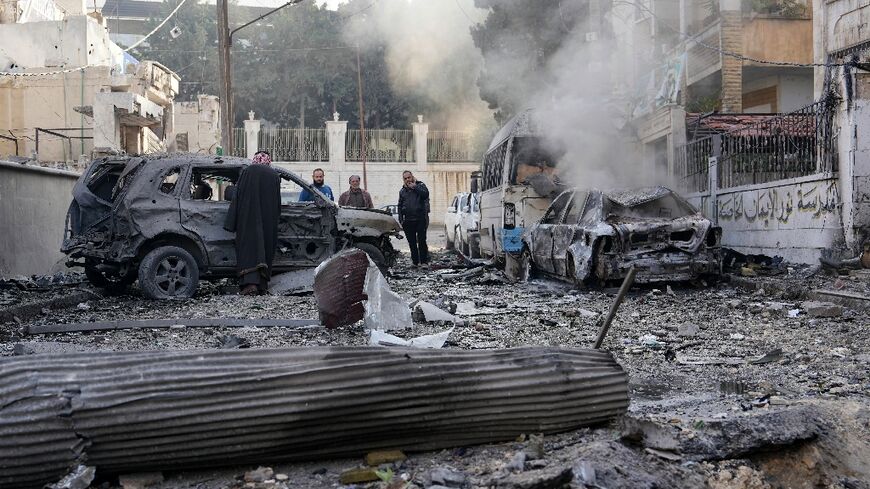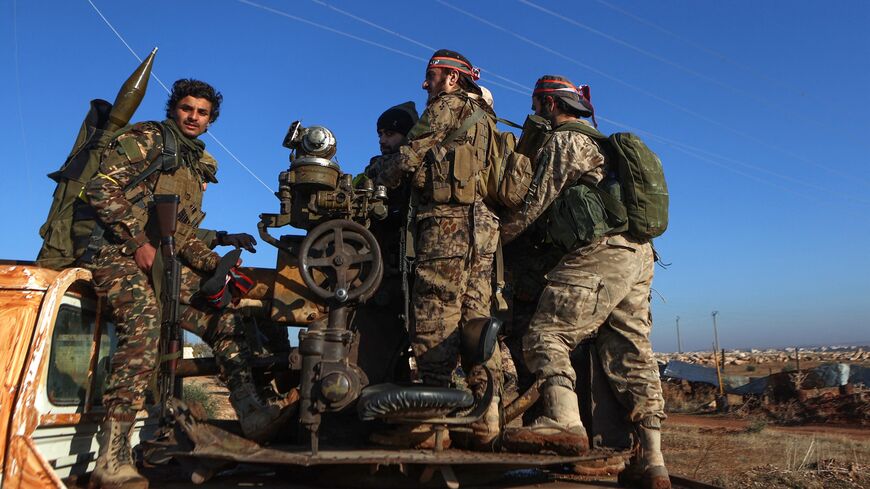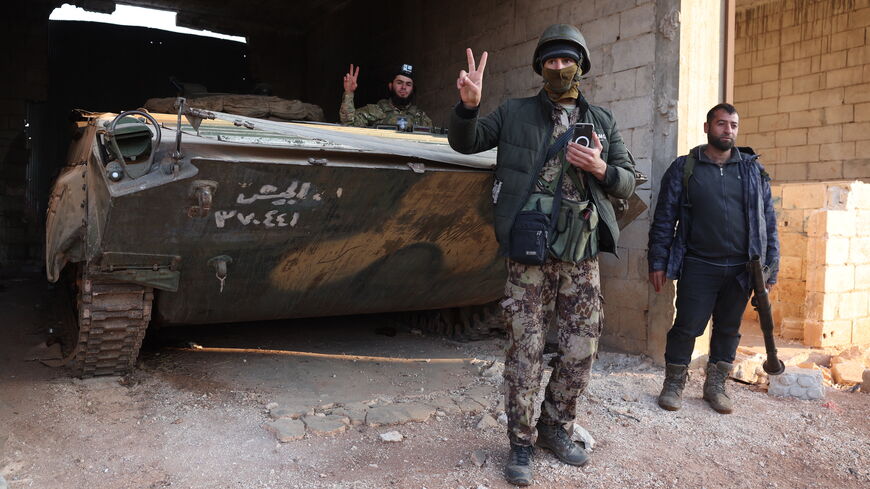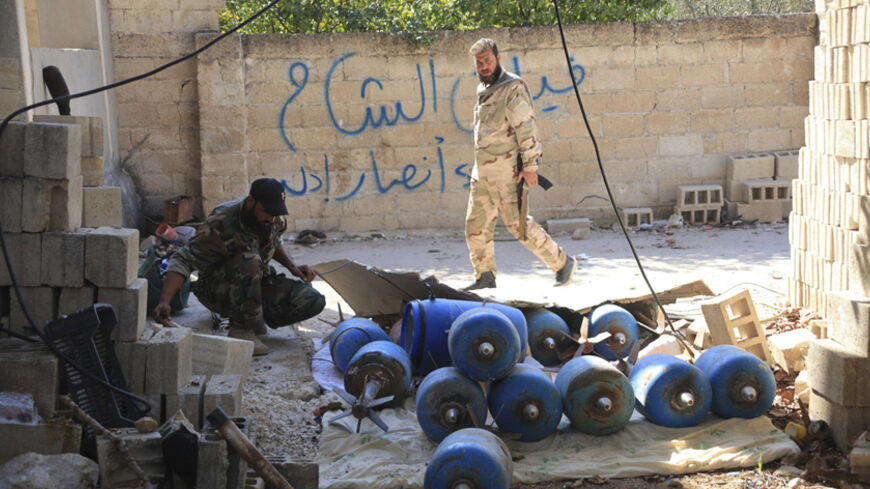After Aleppo, Syria's rebels approach Hama as pro-Iran militias rally to help Assad
The Syrian government is denying reports that rebel fighters are advancing in Hama after taking over most of Aleppo province.
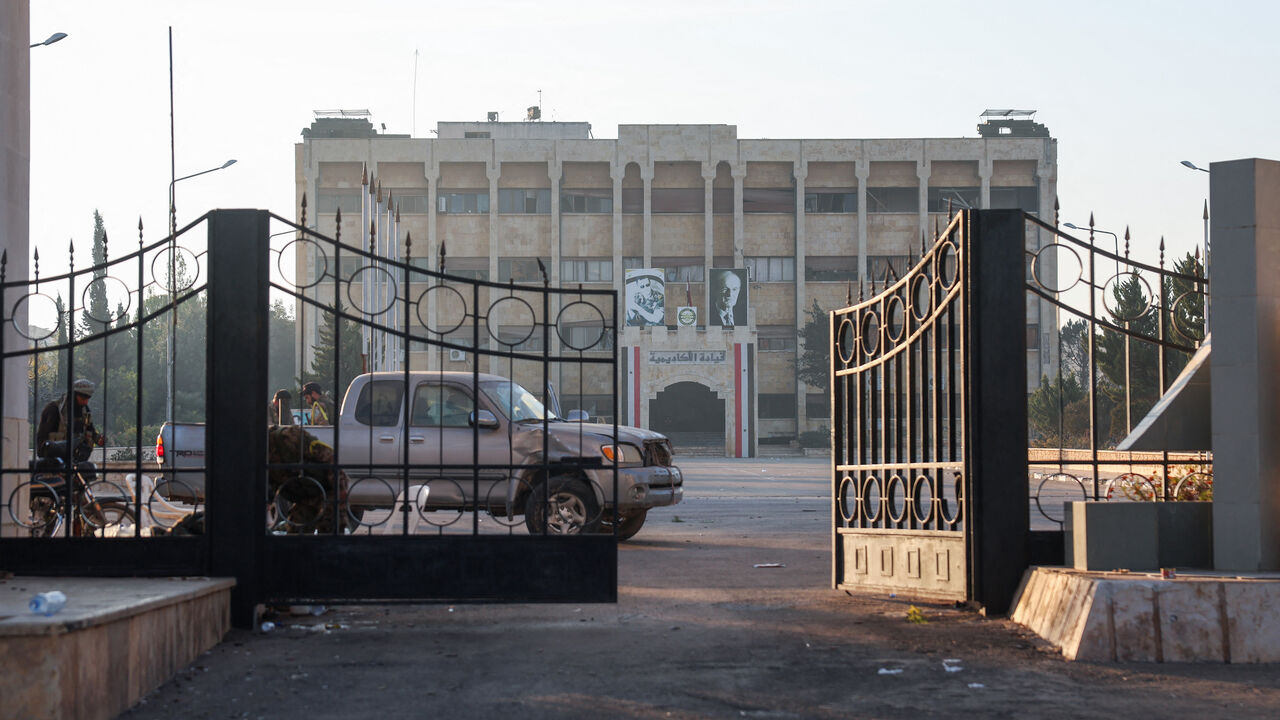
Since launching a surprise offensive against Syrian government forces in the northwestern province of Aleppo last Wednesday, a coalition of opposition fighters led by the Islamist militant group Hayat Tahrir al-Sham have quickly advanced in the area, taking control over large parts of Aleppo and the surrounding towns.
By Monday, the rebel forces claimed to have advanced toward neighboring Hama province after taking control of all of Idlib’s countryside and Aleppo province, including most of Aleppo city, Syria’s second-largest city after its capital Damascus.
In a statement on Telegram Sunday, the coalition of opposition groups said its fighters have “made great progress on the northern Hama countryside axis and expelled the criminal regime forces from the villages of al-Tulaysieh, Shouaatha, Fan Shamaly, Talat Al-Rai and and Taybat Al-Ism, and the progress is still ongoing.”
The forces claimed to have continued advancing in Hama’s countryside, saying in another statement on Monday that they took control of seven new areas without naming them.
In response to the rapid advances by the rebels, the Syrian army, backed by Russian warplanes, launched a counteroffensive, striking rebel positions in the north.
More than 446 people from both sides including civilians have been killed since the start of the assault, according to the UK-based Syrian Observatory for Human Rights, while thousands of others have been displaced.
The clashes in Aleppo, which was under government control since 2016, were the first and the most violent since a ceasefire between Russia, which backs Syrian President Bashar al-Assad, and Turkey, supporting rebel fighters, was reached in 2020 in northwest Syria.
How it started
On Nov. 27, several opposition forces formed a new coalition called the “Military Operations Command” led by HTS, and began moving from Idlib province toward neighboring Aleppo province from the west. They captured dozens of villages in the western Aleppo countryside, including a site belonging to the 46th Regiment of government forces, located near Atarib, according to the SOHR.
In the following days, the opposition forces quickly advanced across the province, announcing their control of several towns and military sites including Hamdaniyya, New Aleppo and Zahra in Aleppo's western countryside as well as the towns of as-Safira, al-Adnaniyah, Jabal Azan and Khanasir in southeast Aleppo.
قوات المعارضة السورية تتمكن من السيطرة على مدينة #السفيرة الاستراتيجية بريف #حلب الشرقي
##ردعَ_العدوان pic.twitter.com/fQhlFZigGn— نون بوست (@NoonPost) December 1, 2024
Commander Hassan Abdul Ghani, speaking for the newly formed coalition, announced Sunday in a series of separate statements on X that the opposition forces captured Sheikh Najjar, known as Aleppo’s Industrial City, the military academy and the field artillery college.
At least four airports in Aleppo and Idlib have fallen into the hands of the rebel forces.
The Turkish-backed Syrian National Army (SNA), which is part of the Military Operations Command, said Sunday it had captured the Menagh air base in the northern countryside of Aleppo. On Saturday the forces announced on Telegram they had taken over Kuweires military airport in the eastern countryside of Aleppo and Aleppo International Airport.
On Saturday, Abu al-Duhur air base in Idlib province was seized by the rebels.
The Military Operations Command also announced on Telegram Friday it had taken control of Saraqib in the east of Idlib province. The key town lies at the intersection of the M4 highway that connects Damascus to Aleppo and the M5 highway that links Latakia to Aleppo.
By Sunday, the newly formed coalition claimed to have control over all of Idlib’s countryside, Aleppo province and Aleppo city. The opposition fighters are now pushing toward Hama. The Military Operations Command claimed Monday to have taken over at least seven towns in the northern countryside of Hama, reports the Syrian government denied.
من #حلب إلى #حماة الفصائل المسلحة تسرع للاشتراك في المعركة المنتظرة.
وزارة الدفاع السورية قالت إن الجيش عزز خطوطه الدفاعية في ريف حماة الشمالي، واشتبك مع الفصائل.
وأنه استعاد قلعة المضيق ومعردس pic.twitter.com/WqpaliWnA2— عبدالرحمن الراشد (@aalrashed) December 1, 2024
Meanwhile, the SNA launched parallel attacks against Kurdish-held towns in the north. The SOHR said Sunday that Turkish-backed forces took control of the town of Tal Rifaat in northern Aleppo province, some 20 kilometers (12 miles) south of the border with Turkey.
The Military Operations Command says its offensive, “Deterrence of the Aggression,” came in response to the increased attacks by Syrian and Russian forces against rebel positions in northern Syria.
Idlib is seen as Syria’s last rebel stronghold and is under the control of HTS. The province is home to around 4 million people, according to the United Nations and relief agencies, the majority of whom were displaced from government-held areas elsewhere in Syria.
Assad defenses
The swift rebel advances in northern Syria were met with a counteroffensive launched by the Syrian army, with air attacks conducted jointly with the Russian air force.
Meanwhile, Iranian-backed militias have reportedly crossed into eastern Syria from Iraq overnight. Two Syrian army sources told Reuters on Monday that dozens of fighters from Iraq's Popular Mobilization Units entered Syrian territory via a military route near Al Bukamal crossing “to aid our comrades on the frontlines in the north.”
While acknowledging the rebels' takeover of large parts of Aleppo city, the Syrian army said it was continuing its operations in the city to expel them and restore stability.
Regarding the developments in Hama, the Syrian Ministry of Defense denied the rebels’ claims about seizing towns in the northern countryside of the province.
A field source told the pro-government Syrian Al-Watan news site on Monday that the army has formed a line of defense in Hama to quell rebel advances, while rejecting claims that rebels had taken over towns in the northern countryside. According to the source, the Syrian army has secured numerous towns and villages in the area, including Tal al-Nasiriyah, Tal al-Samman, Zour al-Jadeed, Zour al-Haisa, Zour Qasiyyah and Zour Balhussin.
The army’s Chief of Staff, Gen. Abdul Karim Mahmoud Ibrahim, conducted on Sunday a field tour in the northern countryside upon the directions of Assad and met with army units deployed in the area, according to the Ministry of Defense.
Ibrahim stressed during the tour that the Syrian army will remain the sole protector of the Syrian people and the defender of Syria’s sovereignty.
On Sunday, the Syrian army sent reinforcements including military personnel, heavy equipment and rocket launchers to the northern countryside of Hama to repel the attacks, according to the ministry.
“Our armed forces managed to secure several areas after expelling the terrorists, most notably Qalaat al-Madiq and Maardas, killing dozens of them while the rest fled,” the ministry stated.
The SOHR, which has a vast network of sources on the ground, reported Monday heavy clashes between the government forces and rebel fighters in Hama’s northern countryside, accompanied by ongoing Russian and Syrian airstrikes.
The Syrian military and Russian warplanes have continued to conduct joint air raids in opposition-held territory in Syria since Wednesday. According to a military statement released on Monday, five command headquarters and seven ammunition and various weapons depots belonging to opposition groups were destroyed in joint Syrian-Russian airstrikes in the past 24 hours.
Regional diplomacy kicks off
Iran, one of the main backers of the Assad government, has condemned the rebel offensive in Syria, blaming Israel and the United States for the recent fighting.
“It was by no accident that the terrorists became active right after a ceasefire in Lebanon,” Iranian Foreign Ministry spokesperson Esmaeil Baghaei told a press conference on Monday, referring to the Israel-Hezbollah ceasefire that began on Wednesday and ended Israel's war on Lebanon.
Assad echoed similar comments during a phone call with his Iranian counterpart, Masoud Pezeshkian, on Monday, accusing Israel and the United States of fomenting division in the region.
“The terrorist escalation reflects the far-reaching goals of dividing the region, fragmenting the countries in it and redrawing the map in line with the objectives of the United States and the West,” a Syrian presidential statement quoted Assad as saying during the conversation.
Pezeshkian stressed his rejection of efforts to undermine the stability of Syria and reiterated his country’s readiness to provide “all forms of support to Syria to eliminate terrorism.”
Iranian Foreign Minister Abbas Araghchi had earlier expressed Tehran’s support for Assad in the face of the rebel advances. During a meeting with the Syrian leader in Damascus on Sunday evening, Araghchi expressed confidence in the Syrian government’s ability to confront the rebels.
“The Syrian people have in the past years managed to confront all forms of terrorism and today they are determined more than any other time to uproot it,” he said.
Following his trip to Syria, Araghchi headed to the Turkish capital Ankara on Monday, where he met with his Turkish counterpart, Hakan Fidan. Speaking at a joint press conference following their talks, Araghchi called on countries in the region, particularly Iran and Turkey, to strengthen their cooperation in order to fight the “resurgence of terrorism” and protect the stability of the region.
He further accused Israel and the United States of being a source of instability in the region.
The Turkish diplomat said the renewed fighting in Syria is the result of unresolved internal issues and is not related to external factors. He also called on the Syrian government to open dialogue with the Syrian people and opposition, while voicing Turkey’s readiness to prevent more escalation in neighboring Syria.
Russia, meanwhile, continues to support Assad and is assessing the situation on the ground after the recent rebel advances in Syria, Kremlin spokesperson Dmitry Peskov told reporters on Monday.
“We continue to support Bashar al-Assad. Contacts are continuing at the appropriate levels,” he said.



